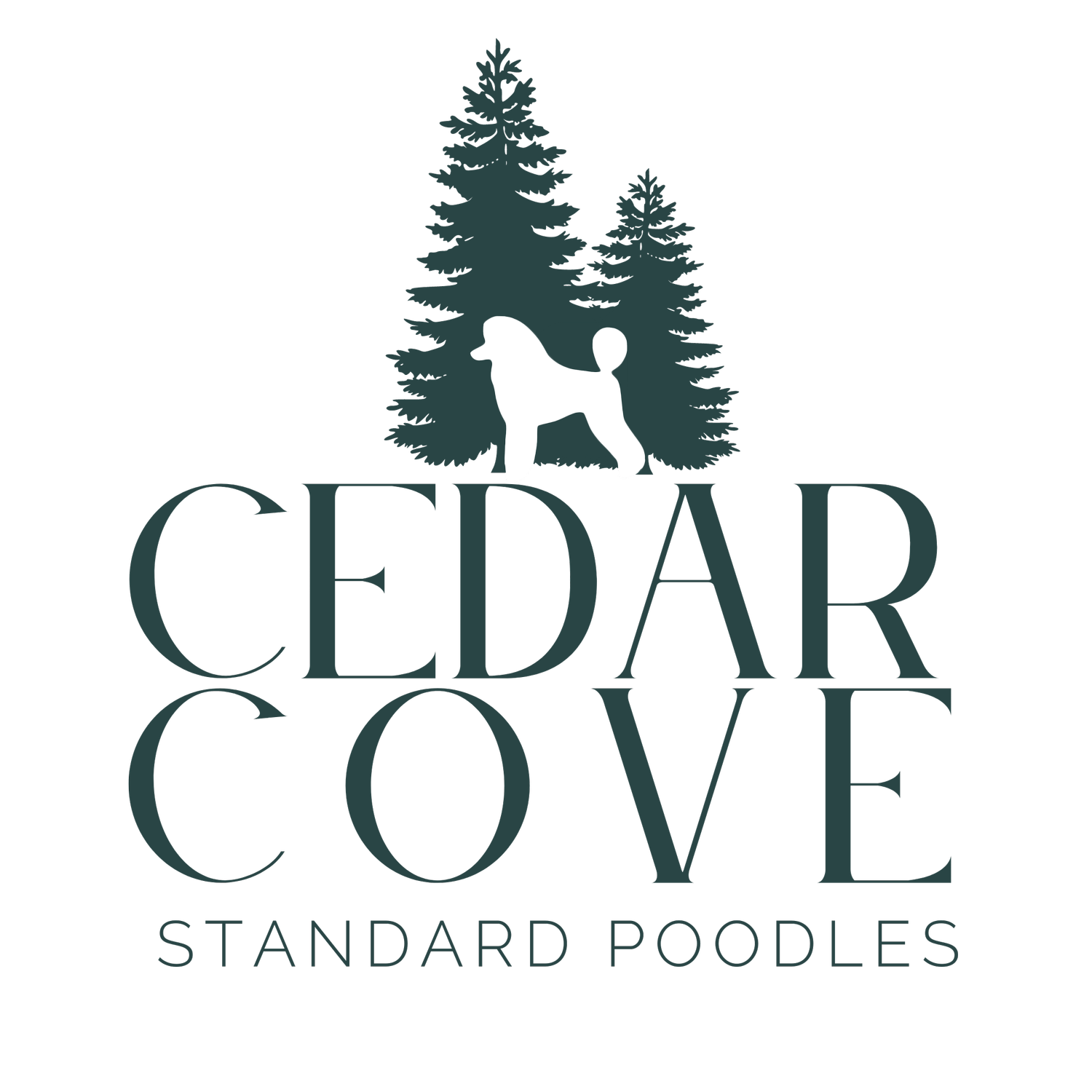An indispensable piece of my program’s foundation is my approach to puppy rearing.
My goal for temperament is, first and foremost, resilience and stability. Beyond these foundational traits, our breed standard also states that a poodle should be active, highly intelligent, and dignified, with a sense of humor. I follow this guideline and enjoy a dog with moderate drive and energy, who is highly cognizant and can process a situation and make decisions accordingly. Stability and correct structure give dogs a sense of dignity, and their intelligence begets humor. Lastly, I breed for biddability and a desire to engage and learn from their owner.
I believe that both nurture and nature play a role in achieving these goals, so each litter receives several months of careful preparation to support both aspects of their growth. Before birth, I utilize U-Penn’s C-BARQ to select for the temperament traits I value most. After selecting the stud I feel will be the most appropriate fit, I use the behavioral inventories of each parent to craft a detailed puppy-rearing plan specific to each litter. These plans are built on the principles taught in Avidog Transformational Puppy Rearing and Puppy Culture.
-
Avidog is an extensive subscription-based resource for both breeders and owners. Their puppy-rearing protocol includes Early Neurological Stimulation, puppy nutrition, recommended vaccine and deworming protocols, Early Scent Introduction, and guidance on creating enriching environments for puppies in order to reduce behavior problems such as jumping, demand barking, food aggression and more.
Avidog Transformational Puppy Rearing includes temperament evaluation to help match puppies to their forever homes and covers many issues owners or breeders may encounter through the first 18 months of a dog’s life. Avidog associate breeders make a commitment to obtaining continuing education throughout their breeding careers, and use the tools provided within the Avidog program to create well-rounded and socialized dogs who thrive in the homes they are matched with.
-
Puppy Culture is a complete program from whelping box to new home that is scientifically proven to greatly improve outcomes for puppies! It covers everything from early neurological stimulation, to aggression prevention, to potty training and leash walking.
Although early socialization matters, puppies will continue to learn and develop for the remainder of their lives. Just like humans, dogs have diverse preferences and motivations as well as unique ways of expressing themselves and taking in information. A good match takes all of this into consideration.
Perfect matches would require perfect puppies and perfect humans that never change or develop. Fortunately, humans and puppies alike have individual strengths and flaws, and neither are static. During the matching process I am looking for certain key characteristics which will form the foundation on which a solid relationship can be built. In order to do this, I have a detailed puppy application, and set aside time to learn about each home, and about each puppy in a litter.
When puppies are 7 weeks old, an experienced evaluator visits our home to complete Volhard testing. A week later, puppies are evaluated for structure, and at 9 weeks we perform the more extensive APET testing. The APET takes a list of 33 traits and gives us an idea of where each puppy lies on this spectrum. After vet checks at 9.5 weeks, I collect all the info I’ve gathered during the interview process with buyers, results of temperament testing and observations of the puppies, and I match puppies to their homes.
Sometimes there are several puppies who may fit well in a single home, or a single puppy who may fit well in several homes. In those situations, I may visit with the evaluator or the families to gain additional insight. This puppy will be a part of a family’s everyday life for a decade or more, and my goal is to place puppies in homes where the relationship can flourish.




